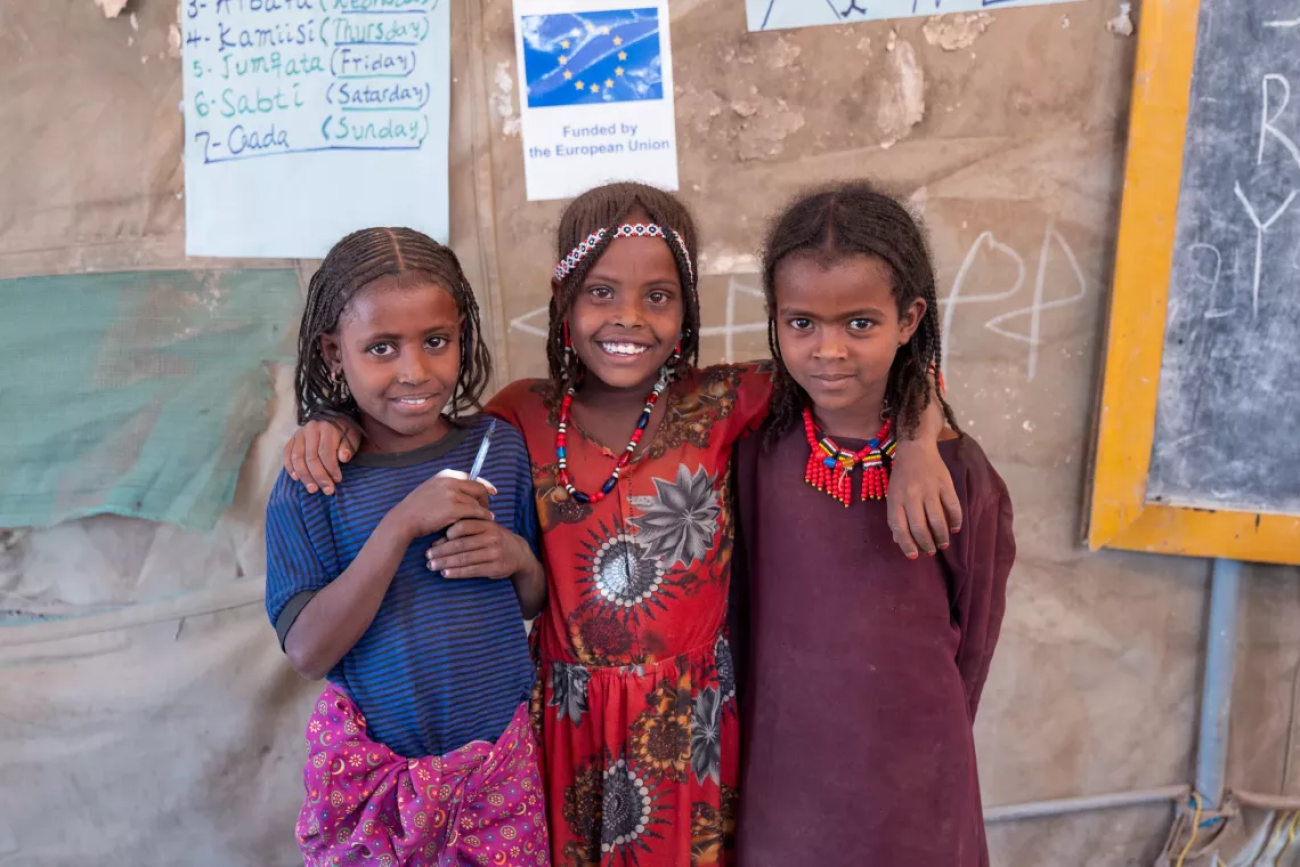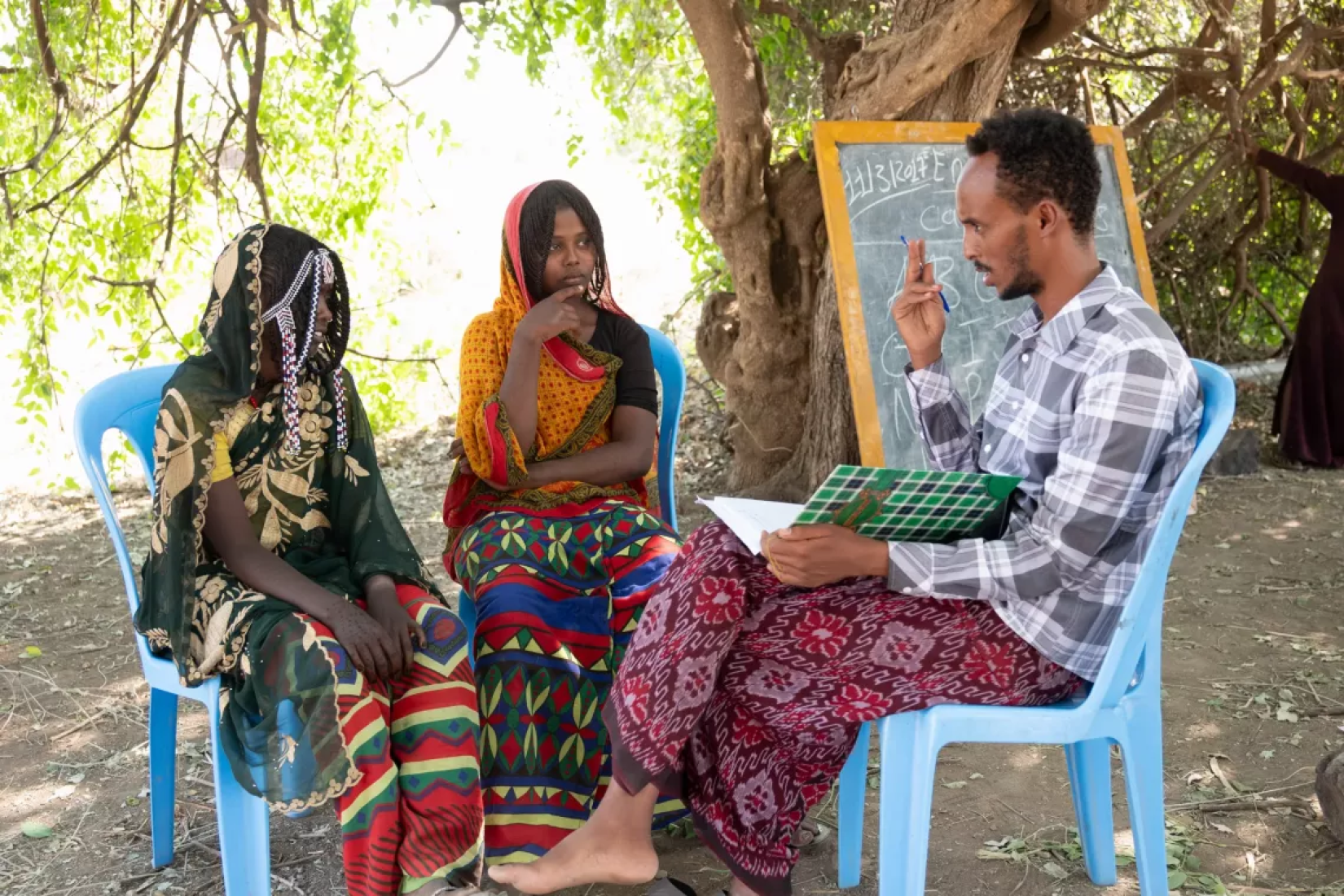Against all odds, adolescent girls find hope in learning

UNICEF-supported accelerated learning programme helps girls to stay in school and protect them from child marriage in Ethiopia.
There is no doubt that education is best for girls. But, what about the challenges? Girls in remote rural communities must overcome multiple barriers before they succeed in education. Climate change, conflict and cultural norms often get in the way of education for girls living in places like the Afar region of Ethiopia. We recently visited Chifra, a town affected by the northern Ethiopia conflict and where UNICEF is working with community champions not only to keep girls in school but also to protect them from child marriage.
Hasna, Hawa, and Uduma are happy to attend class at a UNICEF-supported alternative learning centre in the Afar region of Ethiopia. Their village, Telena Lehada, had its own ordeal two years ago when the northern Ethiopia conflict spread across villages, including the district town of Chifra, affecting schools, health, and water facilities.
“I come here every day to learn numbers and letters with my friends Hasna and Uduma,” says Hawa, a witty young girl who is never afraid to stand in front of class and present her skills. The girls hardly remember the conflict, and they are also too young to worry about child marriage. All they care about for now is learning and playing together.
While Hawa is happy to learn with her friends at a young age, education has more meaning to Fatuma Ali who turned 15 this year. “There is a school in the next town which is far away,” says Fatuma. “Our parents get scared to send us there for learning. So, we stay at home and help.”
For many adolescent girls like Fatuma in Telena Lehada village, going to school has been a challenge. Climate change, conflict and cultural norms often get in their way. The more they stay out of school, the closer they get to being married at early age. But thanks, to a UNICEF-supported Accelerated Learning Programme (ALP), Fatuma is learning.
“I like learning in the Afari language as it is easy to understand,” she says, “If it wasn’t for this programme, I would have been married. And girls should be given the chance to learn and achieve their dreams before they become brides.”
The ALP is designed in such a way that it has compact curricula and flexible learning time. Fatuma completed grades 1 and 2 in one year and now she is in grade 3. Her plan is to continue learning until she graduates college and becomes a doctor.
The impact of the programme extends far beyond the classroom. Communities are sensitized about the importance of girls' education and the consequences of harmful practices like child marriage and female genital mutilation (FGM).
Ahmed Gulup a case worker, shares how they have managed to change perceptions in the community. “We worked on awareness creation first, so the community and girls understand the importance of education. Then we started working with elders and community leaders who can easily influence families to take action.”
Ahmed’s effort would not bear fruit without the support of community champions like Mohammed Dago. Mohammed sets an example by sending his first daughter Halima, who is also Fatum’s best friend, to school. “In our community, women and girls have more responsibility than men. They usually stay at home and take care of the family. But now this perception is changing, and girls deserve a chance to learn,” he says.
Thanks to her father’s support Halima, is happy that she is learning. “I have responsibilities at home, but my father wants me to attend school. After school, I go home to do house chores and then I study. I want my younger siblings to know that there is time for everything.”
A new school block is under construction so that Fatuma, Halima and many more children can learn properly. There is still more work to be done to keep more girls in school. But now, for girls living in the little village of Telena Lehada education is their hope for a better future.

In the Afar region of Ethiopia UNICEF and its partner, Imagine1Day are working to provide learning opportunities for children affected by conflict and climate change through the Accelerated Learning Programme (ALP) and Accelerated School Readiness (ASR). ALP is designed with compact curricula and flexible learning time so that children aged 10-14 can catch up with missed classes and learning opportunities. ASR on the other hand is a school readiness programme that caters for younger children aged 6-7 who have no school experience before. These programmes are generously funded by the European Union and so far, 1640 children have access to ALP and 1500 to ASR in Chifra and Ewa woredas (districts).
By Bethelhem Assefa and Demissew Bizuwerk



